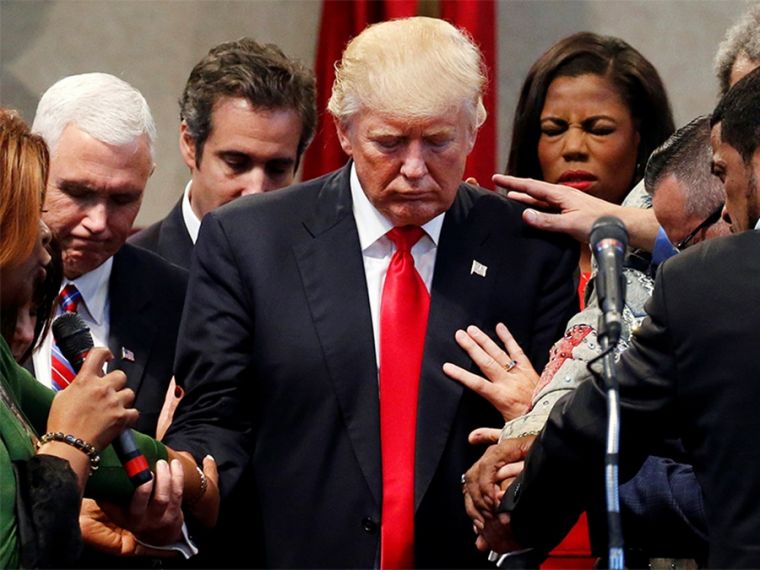'Evangelical' has become too political and needs to be 'reclaimed', says WEA head

The head of the World Evangelical Alliance said that it is "unfortunate" that the term "evangelical" has taken on a more political meaning in the United States and argued that it must be "reclaimed."
While visiting the United Kingdom for a meeting of the U.K. Evangelical Alliance last week, WEA General Secretary Bishop Efraim Tendero spoke with the UK Christian news outlet Premier about his thoughts on the debate over the word "evangelical" happening across the Atlantic in the United States.
"That's unfortunate that in the United States in particular that the word evangelical and the evangelical movement is identified more for political advocacy rather than the orthodoxy of their faith and the demonstration and proclamation of the Gospel," Tendero, who heads a network of churches in 129 nations that gives a "world-wide identity, voice, and platform" to over 600 million evangelical Christians worldwide, explained.
"It doesn't mean that we have to give up that name."
With the rise of President Donald Trump and his conservative evangelical base, some evangelicals in the U.S. have voiced concern that the public perception of the term "evangelical" has been distorted to only describe those who are white social conservatives.
In the long run, Tendero stressed that politics will "pass by."
"But the historicity of the evangelical movement and the meaning and what it stands for will last any political season," he stated. "Let's continue upholding the word evangelical true to its meaning that we care about the Gospel and when we talk about the Gospel, it is not just how we say the Gospel but how we live out the truth and values of the Gospel."
When asked by Premier whether or not the word "evangelical" needs to be "reclaimed," Tendero responded, "Definitely."
"It is not a political agenda or a political organization. It's actually a ministry of people who are committed to the Lord Jesus, people who are committed to fulfill both the Great Commission of Jesus and the Great Commandment of Jesus. It's a proclamation of the word as well as showing that in day-to-day living and having personal and community transformation."
The National Association of Evangelicals released a statement this year to clarify what it means to be an evangelical. The term "evangelical," the group says, is used to describe Christians regardless of their political beliefs of ethnicity who believe in four basic truths.
- The Bible is the highest authority for what I believe.
- It is very important for me personally to encourage non-Christians to trust Jesus Christ as their Savior.
- Jesus Christ's death on the cross is the only sacrifice that could remove the penalty of my sin.
- Only those who trust in Jesus Christ alone as their Savior receive God's free gift of eternal salvation.
Last week, about 39 left-leaning evangelical leaders signed onto a statement called "The Chicago Invitation: Diverse Evangelicals Continue the Journey."
"Sadly, in 2018, several false narratives around the identity of evangelicals in the United States undermine Christian witness and distort American politics," the document reads. "Often, evangelicals are identified in the media and by the public as being predominantly white, right wing, and unconcerned about the poor and oppressed."
"In contrast to these false narratives, evangelicals compose an ethnically diverse group whose movement reflects a historical and ongoing commitment to Jesus, the authority of scripture, evangelism, and God's biblical call to justice," the statement adds.
Included among the signatories of the document are Sojourners founder Jim Wallis, Joel Hunter, a former megachurch pastor who served as one of President Barack Obama's spiritual advisers, Red Letter Christians' Tony Campolo and Shane Claiborne, author Lisa Sharon Harper, and Evangelicals for Social Action President Emeritus Ron Sider.
Earlier this year, dozens of prominent leaders, including influential pastor and author Tim Keller and New York City megachurch pastor A.R. Bernard, held a private meeting to discuss the challenges surrounding evangelicalism.
Also this year, about 10 evangelical activists, scholars and authors wrote essays published in the book "Still Evangelical?"
"Right now, evangelical is one of those labels that is up for grabs because it's been taken and used both by the media and various evangelical voices to mean something that is often quite specific and in many people's minds, antithetical to the Gospel itself," Mark Labberton, editor of the book and president of the Fuller Theological Seminary in California, told The Christian Post earlier.
Courtesy of The Christian Post











